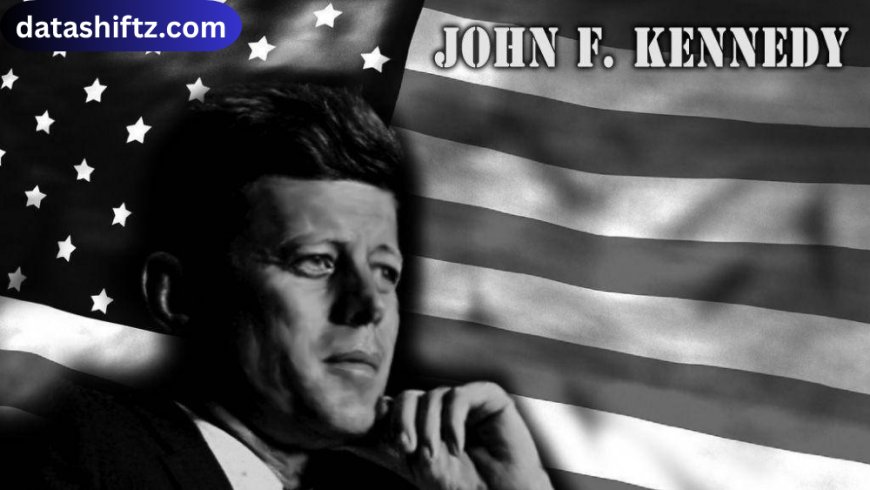John Kennedy: The Legacy of Leadership, Vision, and Inspiration

Introduction
Few names in American history command as much admiration, intrigue, and nostalgia as John Fitzgerald Kennedy, often referred to as JFK. As the 35th President of the United States, Kennedy embodied the ideals of a new generation — youthful optimism, civic duty, and global vision. His presidency, though tragically cut short, left an indelible mark on the United States and the world.
John F. Kennedy’s leadership during a time of great tension — from the Cold War to the Civil Rights Movement — reflected a balance of courage and compassion. His words, “Ask not what your country can do for you — ask what you can do for your country,” continue to inspire leaders and citizens alike.
This article explores John Kennedy’s early life, presidency, political philosophy, accomplishments, and enduring legacy, offering an in-depth understanding of one of America’s most iconic figures.
Early Life and Education
Born on May 29, 1917, in Brookline, Massachusetts, John Fitzgerald Kennedy was the second son of Joseph P. Kennedy Sr. and Rose Fitzgerald Kennedy, both members of prominent Irish-American families. From an early age, he was surrounded by ambition, intellect, and the expectation of greatness.
Kennedy attended the prestigious Choate School before enrolling at Harvard University, where he studied international affairs. His senior thesis, later published as “Why England Slept,” examined Britain’s lack of preparedness before World War II — a sign of his early interest in global politics.
After graduating from Harvard in 1940, Kennedy joined the U.S. Navy and served heroically in World War II. When his boat, PT-109, was struck by a Japanese destroyer in 1943, Kennedy led his crew to safety, earning the Navy and Marine Corps Medal for courage. This experience solidified his image as a man of resilience and leadership.
Key Facts About John F. Kennedy
| Category | Details |
|---|---|
| Full Name | John Fitzgerald Kennedy |
| Born | May 29, 1917, Brookline, Massachusetts |
| Died | November 22, 1963, Dallas, Texas |
| Political Party | Democratic Party |
| Spouse | Jacqueline Bouvier Kennedy |
| Children | Caroline Kennedy, John F. Kennedy Jr. |
| Education | Harvard University (B.A., Government) |
| Religion | Roman Catholic |
| Presidency | 35th President of the United States (1961–1963) |
| Vice President | Lyndon B. Johnson |
Political Career and Presidency
Entry into Politics
After World War II, Kennedy entered politics, inspired by a sense of duty and encouraged by his father’s political ambitions for the family. He won a seat in the U.S. House of Representatives in 1946 and later served in the U.S. Senate from 1953 to 1960. His reputation for intelligence, charisma, and eloquence quickly made him a rising star within the Democratic Party.
In 1960, Kennedy ran for President against Richard Nixon. His youthful energy, coupled with the historic first televised presidential debates, helped secure his victory. At just 43 years old, Kennedy became the youngest elected President in U.S. history and the first Roman Catholic to hold the office.
The New Frontier Vision
Kennedy’s presidency was defined by his “New Frontier” agenda — a call for progress in science, education, civil rights, and global peace. He envisioned a nation driven by innovation and compassion, one that would expand its frontiers on earth and in space.
His administration’s goals included:
-
Fighting poverty and inequality
-
Advancing civil rights legislation
-
Promoting space exploration
-
Strengthening international alliances
This vision set the tone for a dynamic, forward-thinking America that sought both technological advancement and social justice.
Key Achievements During His Presidency
Kennedy’s presidency, though brief, was marked by several pivotal achievements:
-
The Space Race: He famously declared that America would put a man on the moon before the decade’s end — a challenge that culminated in the Apollo 11 landing in 1969.
-
Civil Rights Advocacy: Though cautious at first, Kennedy later took a firm stand, proposing legislation that laid the groundwork for the Civil Rights Act of 1964.
-
Economic Growth: Under JFK, the U.S. economy experienced strong growth driven by tax reforms and infrastructure investment.
-
Peace Corps: Established in 1961, the Peace Corps embodied Kennedy’s belief in global cooperation and humanitarianism.
-
Nuclear Test Ban Treaty: In 1963, he negotiated the Partial Nuclear Test Ban Treaty with the Soviet Union and the United Kingdom — a major step toward nuclear disarmament.
Crisis and Leadership
The Bay of Pigs and Cuban Missile Crisis
Kennedy’s leadership was tested early in his presidency with the Bay of Pigs invasion in 1961, a failed attempt to overthrow Fidel Castro in Cuba. The event was a political embarrassment, but Kennedy took responsibility, learning vital lessons in foreign policy.
The following year, he faced one of the most dangerous confrontations of the Cold War — the Cuban Missile Crisis (October 1962). Soviet missiles in Cuba brought the world to the brink of nuclear war. Through calm diplomacy and firm resolve, Kennedy reached a peaceful resolution with Soviet leader Nikita Khrushchev, earning global respect and demonstrating his ability to navigate extreme pressure.
Commitment to Civil Rights
Kennedy recognized the moral urgency of civil rights reform. He supported the Freedom Riders, protected activists during desegregation efforts, and called for comprehensive civil rights legislation. In a landmark 1963 address, he stated:
“We are confronted primarily with a moral issue. It is as old as the Scriptures and as clear as the American Constitution.”
Though he did not live to see it passed, his proposals paved the way for the Civil Rights Act of 1964, enacted under President Lyndon B. Johnson.
Key Highlights of John F. Kennedy’s Legacy
-
Youngest Elected U.S. President — Elected at age 43, symbolizing a generational shift in leadership.
-
First Roman Catholic President — Broke religious barriers in American politics.
-
Founder of the Peace Corps — Promoted international goodwill and service.
-
Advocate for Space Exploration — Launched the U.S. on its path to the moon.
-
Cuban Missile Crisis Resolution — Demonstrated diplomacy under intense global pressure.
-
Civil Rights Leadership — Laid the foundation for landmark civil rights reforms.
-
Economic Reforms — Stimulated growth through fiscal and tax initiatives.
-
Foreign Policy Vision — Strengthened alliances through NATO and diplomacy.
-
Charismatic Communication — Mastered the use of television to inspire and unite Americans.
-
Enduring Inspiration — Continues to influence leaders worldwide through his speeches and ideals.
The Tragic Assassination
On November 22, 1963, while riding in a motorcade through Dallas, Texas, Kennedy was assassinated — a moment that shocked the world. Lee Harvey Oswald was arrested as the alleged assassin, though conspiracy theories persist to this day.
Kennedy’s death marked the end of an era often referred to as “Camelot,” symbolizing hope, elegance, and idealism. His legacy, however, continues to shine through his words, policies, and the generations inspired by his example.
Conclusion
John F. Kennedy’s life and presidency represent a blend of intellect, courage, and compassion that continues to define American political ideals. Though his time in office lasted less than three years, his vision for a better, fairer, and more peaceful world remains timeless.
From steering the nation through Cold War tensions to igniting the dream of space exploration, Kennedy proved that great leadership transcends time and circumstance. His speeches, ideals, and policies still echo in classrooms, political movements, and national aspirations across the globe.
John F. Kennedy once said, “A man may die, nations may rise and fall, but an idea lives on.” Indeed, his idea of America — bold, brave, and compassionate — continues to live on as a beacon of hope and leadership for all generations.






























